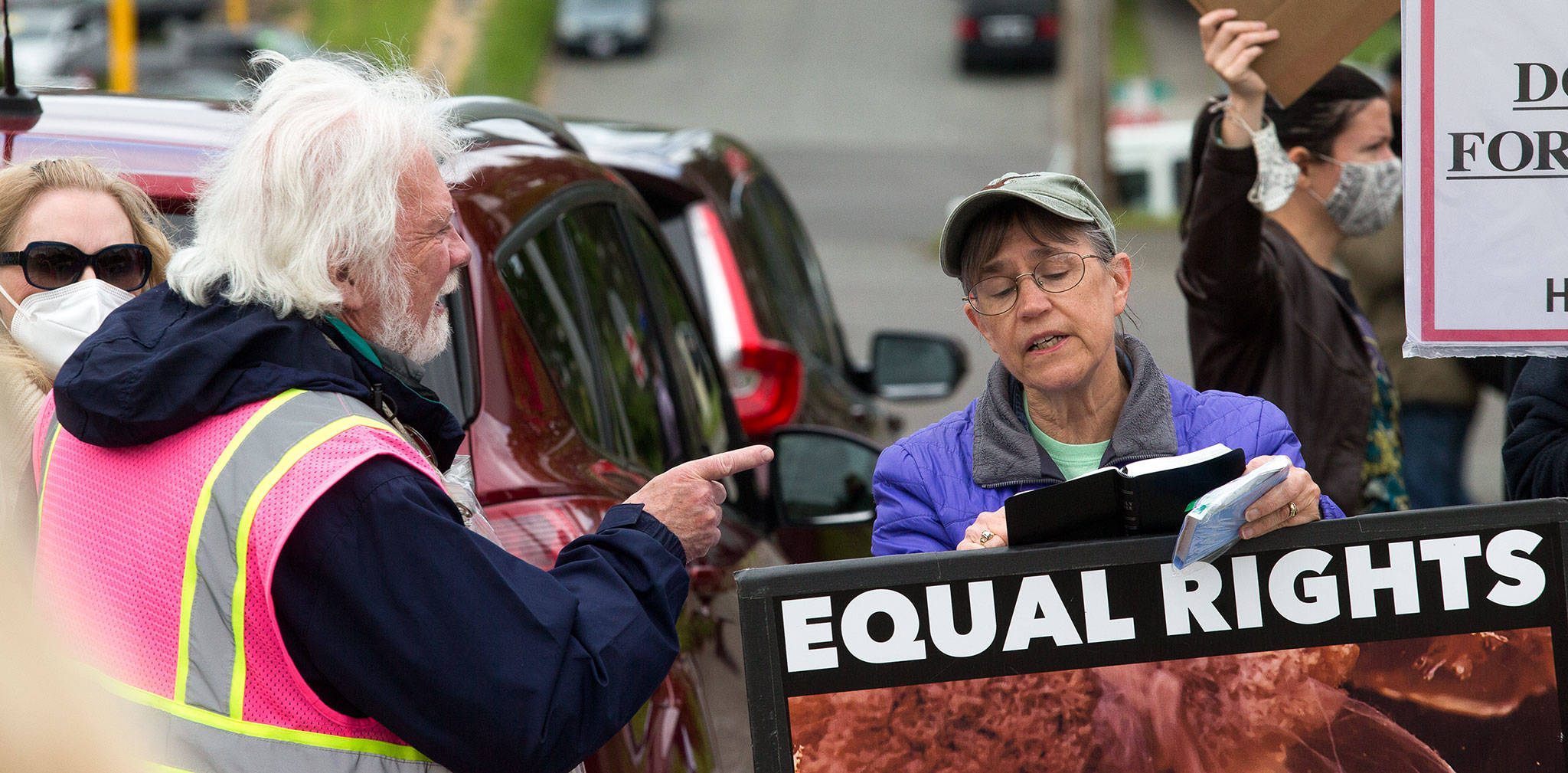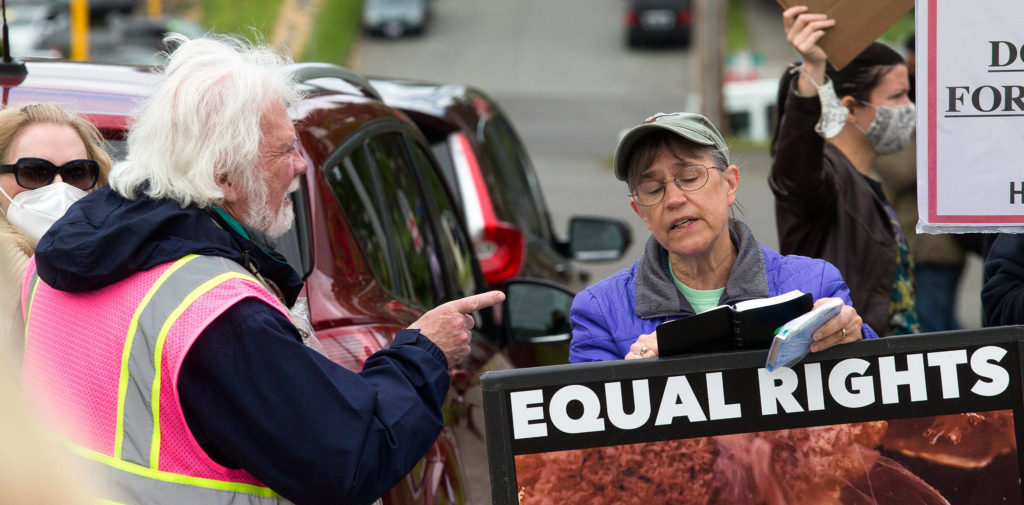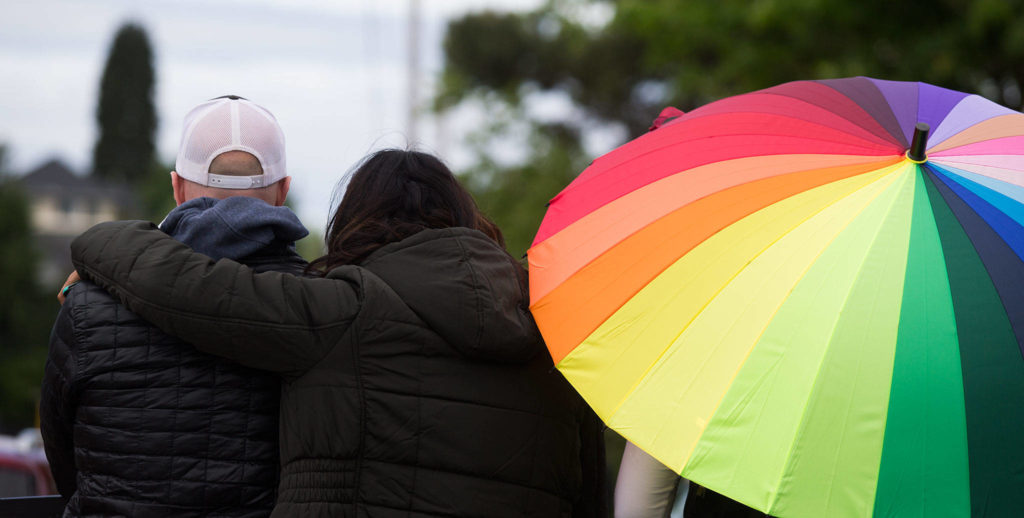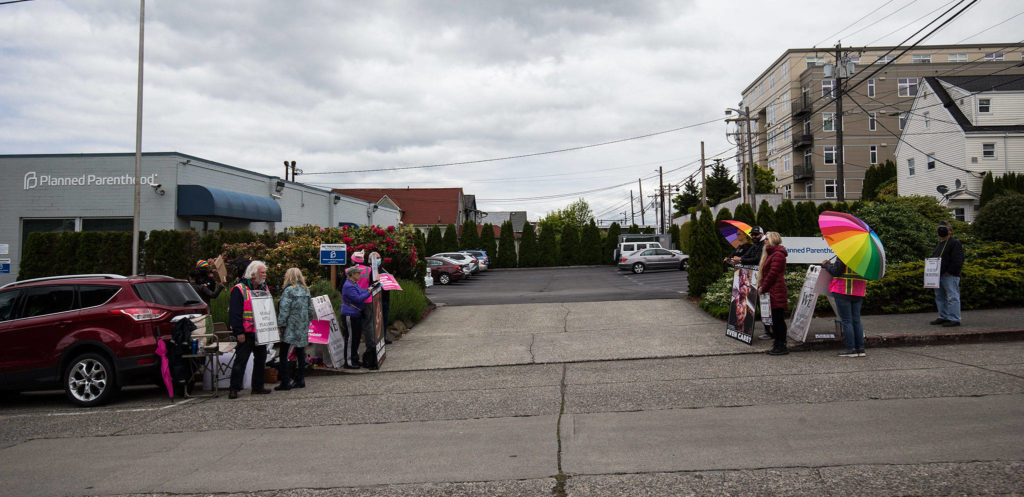EVERETT — Demonstrators against and for abortion rights once again are mingling at weekly gatherings on the sidewalk around the Planned Parenthood clinic at 32nd Street and Hoyt Avenue, after the city last week lifted restrictions that were in place for months.
Earlier this year, the city implemented what are called time, place and manner restrictions during recurring Wednesday demonstrations outside the health clinic. The city previously had similar rules for monthly Saturday gatherings at the clinic.
Anti-abortion activists had been clashing with pro-choice advocates in boisterous and contentious confrontations. None resulted in criminal charges, but the gatherings became a public safety concern, which prompted the restrictions, city officials said in April.
The rules prohibited protests on the public right-of-way adjacent to the clinic and effectively separated the factions. Clinic supporters met on the sidewalk across from the clinic’s driveway on 32nd Street. People opposing abortion convened on the corner southwest of the clinic on Hoyt Avenue.
Everett Police Department officers enforced the restrictions and kept protesters away from the sidewalk and alley adjacent to the clinic, and staff would erect a short fence barrier along the sidewalk each Wednesday.
“Buffer zones are enacted to protect patients from harassment and assist in keeping people safe,” city spokesman Julio Cortes said in an email.
But the city ceased the restrictions around the clinic last week because “the police department concluded the risk to public safety at the Wednesday protest was minimal and removed the temporary restrictions with the belief individuals could avoid conflict without barriers or designated protest areas,” Cortes said. “The restrictions were preventative and intended to be temporary.”
When they were in force, the city’s restrictions drew intense interest, with several letters to the editor published by The Daily Herald.
It also drew a legalistic rebuke from the Thomas More Society, a Chicago-based law firm that purports to have a “Judeo-Christian family values” mission and has specialized in anti-abortion legal cases. Attorney Matt Heffron, in a six-page letter to Everett City Attorney David Hall dated May 11, argued the city should end its restrictions or face a court fight. He claimed the city’s law enforcement “acted beyond its authority” and that the restrictions created a buffer zone that gave “preferential treatment” to pro-choice advocates, were based on the content of the topic and weren’t narrowly tailored to the city’s public safety interest.
“As applied here, the City’s restrictions violate my clients’ First Amendment rights,” Heffron wrote. “My clients would prefer not to have to vindicate their rights by engaging the City of Everett in a legal battle. However, they also do not intend to be arbitrarily coerced to refrain from doing what they have a Constitutional right to do. As probably is apparent, we currently are preparing to file a lawsuit in this matter in federal court …”
Janean Desmarais, an Everett resident and clinic supporter who used to volunteer as an escort for patients and staff before the pandemic suspended the program, criticized the city for ending the restrictions and allowing people to once again gather in view of the clinic’s front doors and driveway.
“We are not surprised at the City of Everett’s decision to back down from a well-funded Catholic organization such as The Thomas More Society that has pressed the City to no longer protect the citizens from the harassment of anti-abortion protesters when visiting Planned Parenthood,” she wrote in an emailed statement.
Before the city began enforcing time, place and manner restrictions around the clinic, the opposing advocates clashed — often loudly. Some people prayed quietly, others hollered at people, often women, entering the health care facility.
Ed Mohs, who has opposed abortion rights at the clinic for years, said interactions have been “minimal” and “peaceful” since people were allowed back onto the sidewalk near the driveway.
“It’s nice to have the freedom on the sidewalks again without being restricted,” he said. “The city’s reaction was probably overstepped. Though with good intentions, it was probably overzealous on their part.”
In some videos of the gatherings from earlier in the year, anti-abortion advocates called abortion “murder.”
Many of the interactions drew shouting, noisemaking and sometimes swearing from clinic and patient supporters, who wanted to drown out the anti-abortion crowd’s message. Others held umbrellas to block the view of posters and signs held by the anti-abortion demonstrators.
Desmarais said the message of people praying to end abortion was well understood and visible across the street, as is Two Hearts Pregnancy Aid.
“Any person entering or exiting Planned Parenthood could take it upon themselves to walk across the street and engage with the anti-choice crowd,” she wrote. “People finally had a choice about engagement, something we know the anti-abortion (ideology) is staunchly against, and now patients and staff will once again be subjected to yelling, name calling, harassment, and duped into taking inaccurate medical information about their health from people who are not doctors.
“ … Abortion is normal and it is not going away, and neither are we. See you on the sidewalk.”
Ben Watanabe: bwatanabe@heraldnet.com; 425-339-3037; Twitter @benwatanabe.
Talk to us
> Give us your news tips.
> Send us a letter to the editor.
> More Herald contact information.




























